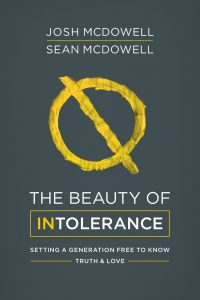With this, our thirtieth blog post on the topic of cultural tolerance, we conclude our series based on the book The Beauty of Intolerance. As Top Ten lists are so popular, let’s use that format to remind ourselves of some of the important things we’ve learned about cultural tolerance together over the last six months.

Ten things we’ve learned about cultural tolerance:
1. We’ve learned that people are not “bigots” or “intolerant” or “unloving” simply because they don’t agree that cultural tolerance has the right view on truth. Committing to live by God’s standards, which we find outlined in His Word, means that our view of truth may be very different from the world’s. Let us not, by our behavior or words, earn those unkind labels. As Christians, Jesus calls us to be known for reflecting His unceasing love.
2. We’ve learned that we don’t need to be ugly in our defense of God’s truth. We most certainly do not get a pass on being jerks. So, no, we do not get to tell people they are going to hell — and we definitely should NEVER think it okay to hold up signs that scream “God hates YOU!!” (Sigh. Some “Christians” really do that?) How does our being rude motivate anyone to want to kick the tires of Christianity? When Christians act self-righteously, we all lose. Because hate leads to more hate. God hates sin, but He is NEVER against us, as individuals. God loves US ALL — a truth He repeats NUMEROUS times in His Word. If God hated us, would He have sent Jesus to redeem us? No way, no how.
3. We’ve learned that cultural tolerance wants us to operate from our emotions and experiences, not God’s universal truth. The fallout of living according to how we feel? We become a society populated by self-obsessed people. One of the expressions I hate most: “What’s in it for me?” Gag. I don’t know about you, but I want to live in a society that places a premium on mutual respect and care — simply because we’re all God’s children.
4. We’ve learned that cultural tolerance professes to truly embrace tolerance and diversity, but does not. If our society were really interested in everyone being “who they are,” cultural tolerance would respectfully honor Christianity as a lifestyle option. But as cultural tolerance is only interested in its viewpoint, it clearly displays its own intolerance.
5. We’ve learned that our children are heavily influenced by lifestyle messaging that runs counter to how God asks us to live. Cultural tolerance teaches our youth that happiness comes from “personal choice.” But mature Christians know that lasting happiness comes with choosing to make lifestyle choices that honor God. Have you taken the time to review your child’s school curriculum? Which belief statements must you address, to ensure your children respect and seek out God? Have you encouraged your children to be authentic Christ-followers at all times, even at school, where their religious freedom is guaranteed by the Constitution? Some school administrators, teachers, and even parents may feel they are making the “fair” choice in their attempt to ban religious expression at school. But in doing so, they trample our legal rights. Religious freedom is precious; we must protect it.
6. We’ve learned that cultural tolerance employs peer pressure to shame Christians for not accepting all lifestyle choices. The world may think it uncool to believe in and follow God’s seemingly restrictive standards, but having a personal relationship with the creator of the universe is the coolest thing we’ll ever do in life. Joyfully own it! It may feel easier to hide our belief in God’s universal truth, but doing so hinders us from serving as God’s light in the darkness. But let us be kind, and wise, when telling people about God’s expectations for right living. I heard a pastor make this point at a recent bible study. “When I visit a member of my congregation in the hospital, should I immediately berate him for causing a car accident because he was texting? Or,” he asked, “should I simply offer comfort — until he asks for guidance on making wiser driving habits?”
7. We’ve learned that many people embrace cultural tolerance because complete freedom sounds too good to pass up. But how many people have thought through the consequences of society truly operating from an “anything goes” viewpoint? Remember the “Person on the Street” interview I highlighted in a recent blog post? One young woman interviewed said she’d be okay with allowing an incestuous couple (father and daughter) into her “safe space” because “people should be allowed to do what they want.” I wonder if she would change her answer, if she gave more thought to the dire consequences that could result from condoning such a relationship. #actions #consequences #wisdom
8. We’ve learned that the influence of cultural tolerance is so pervasive, that even the Church is catering to it. Some churches won’t even address the topic of sexual sin, so as to not possibly offend attendees. But we don’t get to cherry pick what is and is not sin; God has already laid out those guidelines for us. Want to join God’s team? You gotta play by God’s rules — just as we would if we joined any other club or group.
9. We’ve learned that cultural tolerance can’t be faulted for calling out Christians when we are selfish, immature, and outright bratty — because God calls us out first. Cultural tolerance reminds us of our pesky human failings, which should motivate us to quickly turn, with remorseful hearts, to God. Do not allow the world to attach a permanent label to you, if you mess up. God does not demand perfection from us, but growth. Hallelujah! We can stop beating ourselves up — and stop empowering cultural tolerance to manipulate us into going along with what it dishes out. #wisdom
10. Lastly, we’ve come to understand that there is beauty in being labeled “intolerant,” if the label is meant to disrespect our relationship with Christ. Non-believers can’t quite grasp the beauty of a human heart fully submitted to Christ. But let’s hope and pray that they begin to see something in our lives that makes them curious and open to Christ. We can start by brightly displaying God’s steadfast love and truth.

This blog post has been adapted from the book The Beauty of Intolerance, by Josh and Sean McDowell.













